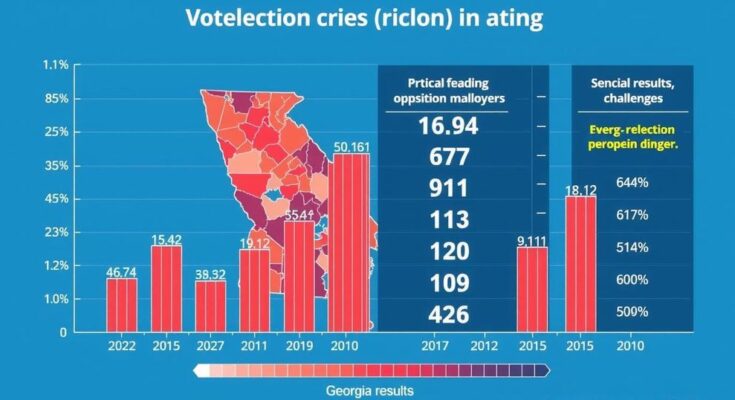Georgian elections on October 26, 2024, have been marred by allegations of voter fraud and violence. The ruling party, Georgian Dream, claimed a landslide victory, but exit polls and opposition data suggested otherwise, raising serious doubts about the election’s integrity. The political environment has grown increasingly polarized, with external pressures complicating Georgia’s aspirations for closer ties with the EU. The situation reflects a broader global challenge of ensuring free and fair elections amidst rising insecurity and democratic erosion.
On October 26, Georgians participated in pivotal elections, the most significant since 2003. The ruling party, Georgian Dream (GD), declared a victory amidst allegations of voter fraud from opposition factions and various election observers. While Prime Minister Iralki Kobakhidze proclaimed a “landslide” win, the accuracy of the election results has come under scrutiny, illustrated by divergent figures from exit polls that favored opposition parties. The Central Election Commission (CEC) announced preliminary results showing GD at 56%, but observers highlighted concerns regarding voter intimidation and violence, undermining the credibility of these results. Opposition claims included major discrepancies between their data and official figures, fueling doubts about the election process’s integrity.
The political climate in Georgia has been turbulent, as the GD has governed for twelve years. This election cycle, the party leveraged fear of external threats, presenting opposition as a threat to national stability in the context of heightened tensions related to the ongoing war in Ukraine. The controversial “foreign influence” law passed in June 2024 further strained Georgia’s relationship with the European Union, which had stalled Georgia’s membership process in light of growing anti-Western sentiment. In response, GD’s founder, Bidzina Ivanishvili, has expressed intentions to suppress dissent, labeling dissenters as influenced by foreign entities while seeking closer alignment with Moscow.
The global landscape this year has been marked by numerous elections, with at least 70 countries conducting or preparing for such events. This trend underscores the importance of electoral integrity and the need for governments to ensure that the democratic process is free from violence and intimidation. Each instance of election-related violence, including in Georgia, raises alarms about democratic erosion and the effective accountability of governments. The role of independent observers and NGOs is vital in safeguarding electoral processes by investigating any credible allegations of fraud thoroughly.
In summary, while the GD touts its electoral victory, the allegations of fraud and violence signify underlying issues that merit extensive examination. The implications of these contested results extend beyond Georgia, highlighting the pressing need for global vigilance in preserving democracy and the rule of law.
Georgia’s recent elections have become a focal point of contention, particularly due to the ruling party’s long-standing grip on power and the contentious political environment. Georgian Dream has been at the forefront of governance since 2012, adopting a nationalistic approach that resonates with citizens wary of external conflicts. The past year has presented challenges, including international relations impacted by a controversial law perceived to inhibit democratic processes. The broader context of global elections, and the associated violence witnessed in various regions, parallels the concerns raised within Georgia, marking a trend of democratic backsliding that calls for immediate attention.
The electoral events in Georgia underscore a critical junction for the nation as allegations of voter fraud and election violence cast a shadow on the ruling party’s legitimacy. Efforts to investigate these claims and the role of international monitoring are essential in safeguarding democratic principles. As the situation unfolds, it is crucial for both citizens and the international community to remain engaged in promoting transparency and accountability within the electoral framework.
Original Source: theowp.org




